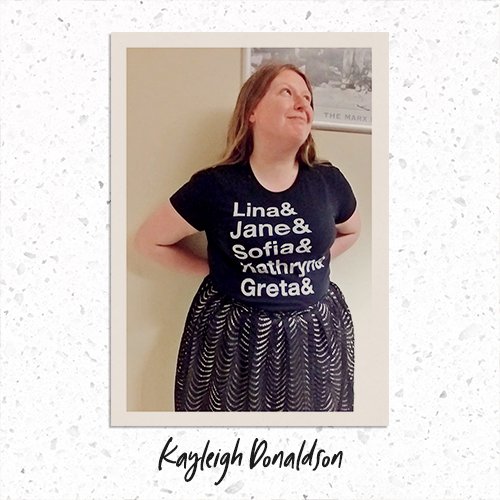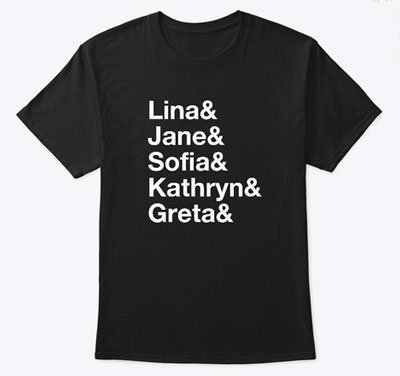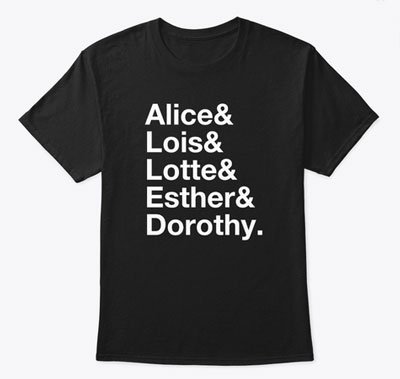Can you introduce yourself and tell us about the projects/work you’re most proud of?
My name is Kayleigh Donaldson. I’m a pop culture writer, critic and editor, and I’ve been doing that for just over two years now. I’m a features writer for Screen Rant, Pajiba.com and SYFY FANGRRLS, where I also edit. I’m also the co-host of the podcast The Hollywood Read, which I do with my friend, Lainey Gossip writer Sarah Marrs. As someone who has been obsessed with consuming, dissecting and interacting with pop culture since I was a kid, I feel incredibly privileged that I get to make my living from being part of those wider conversations. In the short time I’ve been doing this professionally, I’ve been fortunate to do cool things like cover the 2018 Toronto International Film Festival and work with SYFY on the Forgotten Women of Genre podcast, where I wrote episodes on people like editor Margaret Sixel and costume designer Eiko Ishioka.
What inspired you to become a film and pop culture writer?
I basically fell into writing professionally. I’d been a blogger for many years before, mostly focusing on literature and Young Adult publishing, but never imagined I could get paid for it! Eventually, I applied to write for Screen Rant and got accepted, then a few months after that I was picked up by my editor Dustin Rowles at Pajiba, and it’s there where I really learned hone my style and focus into something that I’ve made my name on. I’m forever humbled by the platform that I have and what I am able to do with it.
Why does representation matter to you?
As a cisgender white woman with some financial security and good relationships with my family, I am keenly aware that I have a level of privilege that I can use to amplify the voices and idea of those who don’t. Working in a field that is still heavily cishet, white, and male, I see how certain narratives are strengthened and how many really questionable ideas about the pop culture we consume are simply accepted as fact. What is maligned as “political correctness gone mad” or “oversensitive feminism” is just common sense: Films should be more inclusive in their casting; we should allow more diverse storytellers to take control of their own narratives; when women barely account for 10% of directors, that’s a massive failing that hinders us all. Pop culture is a mirror that exposes how we see ourselves and those around us. It is that great empathy machine that Roger Ebert talked about, and if we don’t open up its possibilities to everyone, especially to those who have been denied such opportunities, then we are all poorer for it.
What inspired you to create two sets of t-shirts that celebrate women directors? And why these women in particular?
Representation is also about filling in the gaps of our past and reclaiming it for those who were written out of the narrative. The history of women in cinema is as old as the medium itself but is seldom discussed as such. Over the past decade of so, conversations about the marginalization of women directors have become more commonplace but we often forget or overlook the historical importance of the women who were always there. That’s what I wanted to draw attention to with these two designs: The first one pays homage to the five women who have received Oscar nominations for Best Director, and the other centres a handful of the pioneers of cinema from its earliest days. For the Oscar nominees, I wanted people to say their names and remember their historic contributions but also be a little pissed off that every single nominee over 91 years can fit on one t-shirt with room to spare. It’s disturbing and inexcusable that the number is so low. There is an extra & at the end as a symbol for every woman who will follow in their footsteps as well as those who should be in their company but were snubbed by the Academy. For the second design, I was keen to highlight women whose contributions to the medium were crucial but who were seldom afforded the same status as their male contemporaries: Women like Dorothy Arzner, a pioneer who was basically the only woman directing films in Hollywood for a solid decades; Esther Eng, the first female director to direct Chinese-language films in the United States as well as a gay icon; Lotte Reiniger, the ground-breaking animator who made a feature length film over a decade before Walt Disney; Alice Guy-Blaché, widely considered to be the first woman to direct narrative fiction and maybe the only woman to do so in the early 1900s; and Lois Weber, one of the first true auteurs of film who was unafraid to tackle difficult social topics.

Be Natural:
The Untold Story of
Alice Guy-Blaché
Pamela B. Green’s energetic film about pioneer filmmaker Alice Guy-Blaché is both a tribute and a detective story, tracing the circumstances by which this extraordinary artist faded from memory and the path toward her reclamation.
Watch the trailer of “Be Natural”
If you could gift one of these t-shirts to anyone, who would it be? And why?
My directorial idol is Lynne Ramsay, so if she wants a t-shirt, I will happily send one to her!







